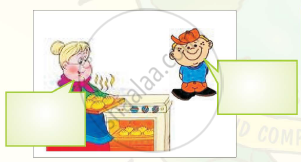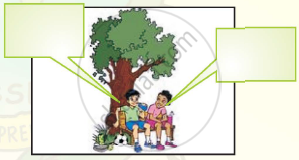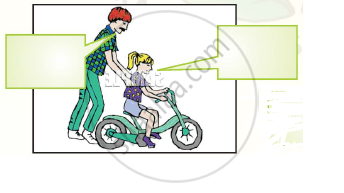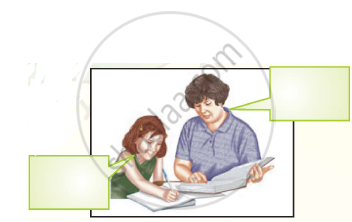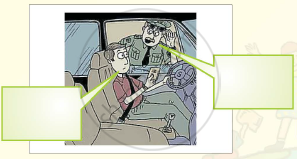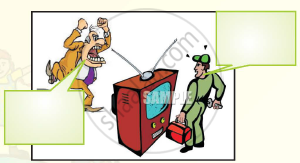Advertisements
Advertisements
प्रश्न
Answer the following question briefly
Could the grandmother succeed in accomplishing her desire to read? How?
उत्तर
Yes, the grandmother did succeed in accomplishing her desire to read. Being illiterate, she felt very dependent and helpless. She was determined to overcome that obstacle and learn the Kannada language. She made her granddaughter her teacher and did amazing amount of homework. She set Saraswati Pooja day as the deadline. She came out with flying colours. She could now read Kashi Yatre on her own.
APPEARS IN
संबंधित प्रश्न
Answer the following question briefly:
(a) What is a ‘nickname’ ? Can you suggest another one for Private Quelch?
Answer the following question briefly:
Private Quelch looked like a ‘Professor’ when the author first met him at the training depot. Why?
On the basis of your reading of the poem, complete the following table.
| Stages in the life of the poet | Activities | Consequences |
| Youth | eating toffees ____________ |
____________ |
| Adulthood | ____________ | gazing at the dentist in despair. |
(A) Working in pairs, fill up the table by asking your partner about what he/ she does on the following days and times.
| Day | 7.00 am | 1.00 pm | 6.00 pm |
| Sunday | |||
| Monday | |||
| Tuesday | |||
| Wednesday | |||
| Thursday | |||
| Friday | |||
| Saturday |
(B) Write a brief account of his/her actions on the specified times and days, in the
space below. Ask further questions, if necessary. Use the simple past/past
perfect tense to write your description.
e.g. (a) Rani visited the zoo on Sunday.
(b) She had.finished all her homework by 5. 00 am on that day.
Study the given notes and complete the paragraph that follows by filling in the blanks.
Mobile phones — emit electromagneticfield — prolonged exposure — researchneeded — brain illness — cancer memoryloss — evidence — likely to cause — healthscares — press reports — people worryneedlessly.
Think about it. Every time you use a mobile phone, (a)_____________ head to electromagnetic emission. Manufacturers (b)___________to prove there is no risk (c)_____________ . Some evidence, so far suggests that mobile phone emissions (d)_________ . These health scares (e)______ . So, people worry needlessly.
(a) (i) he exposes his
(ii) one exposes his
(iii) one exposes one’s
(b) (i) needed
(ii) are needed
(iii) have needed
(iv) need
(c) (i) in brain cancer or memory loss
(ii) from brain cancer or memory loss
(iii) with brain cancer or memory loss
(iv) of brain cancer or memory loss
(d) (i) are likely to cause illness
(ii) are likely for causing illness
(iii) is likely in causing illness
(v) is likely to cause illness
(e) (i) is base on press reports
(ii) have been based on press reports
(iii) are based on press reports
(iv) are being based on press reports
Choose a suitable word from the options given and complete the story from Tunisia.
A weary traveller stopped at a Bedouin’s tent and asked for shelter for the night. Without (a)_______ delay, the man killed (b) _______chicken and handed it to (c)_______ wife for (d)___________ guest’s supper. As the woman stirred the meat in (e) _______ copper cooking pot, she smelled the rich steam and could not resist tasting (f)________ of the meat and soup, to see if it was soft and tasty. But mouthful followed mouthful, and there wasn’t (g)__________chicken left but for the neck piece, which she gave to her little son to nibble. The boy found it so tasty that he whined, “Give me (h)_______ more chicken, mother!” The woman slapped the little boy and scolded him: “It’s a shameful habit (i)______ father taught you, enough of it, I tell you!” On the (j) _______ side of the wooden hanging which screened the woman’s part of the tent from the rest, the traveller overheard them. “What habit has (k)______ father taught (l) _______ child?” he asked curiously. “Oh,” said the woman, “whenever a guest arrives at (m)_______ tent, he cuts off his ears and roasts them over the fire for (n)______ son to eat.” Making not a sound, the traveller picked up (o)_______ shoes and ran.
| (a) (i) no any (ii) little (iii) any (iv) no |
| (b) (i) a few (ii) some (iii) few (iv) a |
| (c) (i) his (ii) her (iii) their (iv) there |
| (d) (i) the (ii) a (iii) theirs (iv) their |
| (e) (i) her (ii) hers (iii) the (iv) an |
| (f) (i) some (ii) few (iii) a few (iv) more |
| (g) (i) any (ii) some (iii) a few (iv) few |
| (h) (i) little (ii) a little (iii) a few (iv) some |
| (i) (i) hers (ii) yours (iii) their (iv) his |
| (j) (i) another (ii) another (iii) other (iv) one |
| (k) (i) hers (ii) her (iii) him (iv) his |
| (l) (i) a (ii) an (iii) the (iv) x |
| (m) (i) x (ii) our (iii) ours (iv) their |
| (n) (i) their (ii) his (iii) him (iv) our |
| (o) (i) her (ii) his (iii) our (iv) x |
The teacher/ student will read out the Radio programme again. Fill in as much information as you can in the following table. Then exchange information with your partner to complete the table.
RADIO SHOW
| Content of programme | Details |
| 1. School News | . |
| . | |
| . | |
| . | |
| 2. Jokes | . |
| 3. 'Meet the Teacher' | . |
| . | |
| . | |
| 4. Advert Time | . |
| . | |
| . | |
| 5. Safety at School | . |
| . |
Answer the following question by ticking the correct option.
Cecil Barker's first reaction at the sight of the dead Douglas was to _____
Past passive –
“Where was it made?”
Look at what your partner is wearing. Imagine where the various items of clothing were (or might have been) made, and tell your partner. Use your imagination!
e.g. A : Was your shirt made in France ?
B : No, actually it was made in Brazil.
Look at the pictures of people talking to each other. With your partners, discuss what they are telling each other. Share your ideas with the class.
